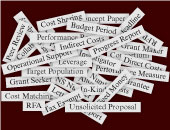 Whether you are hiring a writer or you are doing the writing yourself, it is a must to know the grant writing terms to effectively write one. Using these common words and phrases will allow you to present the proposal to the grant reviewers effectively because you speak the same language they are using. It will also assist you in adding info needed to apply for a grant.
Whether you are hiring a writer or you are doing the writing yourself, it is a must to know the grant writing terms to effectively write one. Using these common words and phrases will allow you to present the proposal to the grant reviewers effectively because you speak the same language they are using. It will also assist you in adding info needed to apply for a grant.
Grant Writing Terms
Check out the list below for some examples of grant writing terms.
- Allowable costs. The costs approved by the law.
- Budget period. Revenue and expenses estimate over a certain period.
- CFDA no. A distinct number made in the Catalog of Federal Domestic Assistance database.
- Collaborator. A person who works in partnership with the firm.
- Concept paper. An initial application, which is normally less than 10 pages.
- Consortium. Two or more firms that work on the same project.
- Cost matching. The process in which the firm awarded with funds needs to match a certain percentage of the total budget needed.
- Cost sharing. A part of the project cost that is not shouldered by the funding agency.
- Deadline. The publication date or the time the grant application should be sent to the agency.
- Direct costs. The costs that are directly related to the project.
- DUNS no. The Dun and Bradstreet Data Universal Numbering System composed of a 9-digit ID number given to the applicants. This is needed when you apply for federal grants.
- Grantee. A person or firm receiving the grant.
- Grant maker. The firm that gives the grant.
- Grant seeker. A person or firm applying for the grant.
- Indirect costs. A budget classification that comprises the general administrative costs, such as maintenance, office rental, travel, and others.
- In-kind. Contributions or resources, except cash.
- Letter of inquiry. Majority of foundations require this before any applicant is invited to submit a full proposal.
- Letter of support. A letter from a credible firm that expresses support to the applicant.
- Leverage. The use of a portion of funds secured by the firm to attract more funding or raise other types of funds.
- Operational support. A donation that was given to assist the daily and ongoing expenses of a firm.
- Peer review. A critical review or judgment of the competency of a proposal by pros or experts in the related field.
- Performance measure. A measurement that can be used to evaluate the performance of a project or program. For example, the number of jobs created, the number of students enrolled.
- Performance reports. A report of the particular activities performed by the grantee throughout the project period. This is a requirement of the grantor or grant maker.
- Principal investigator. The principal applicant, usually, the project director of a firm.
- Progress report. Scheduled reports that summarize the project progress, as required by the funding agency.
- R.F.A. Request For Application, usually, shorter than an RFP.
- R.F.P. Request For Proposal, discussing grant guidelines in details.
- Seed money. Also called startup fund. This is the money needed to start a new project.
- Target population. They are the direct beneficiaries of the project.
- Tax exempt. A legal status conferred by the IRS. This refers to groups that have sufficiently established their education, charitable, scientific, and religious character.
- Unsolicited proposal. A proposal submitted without the official request from the funding agency.
Familiarity with these examples of grant writing terms will allow you to address the requirements of the funding firms. It will also allow you to write or understand a grant proposal easily. So, the next time you write or read a proposal written by a grant writer, you are now fully aware of how you can use them.






